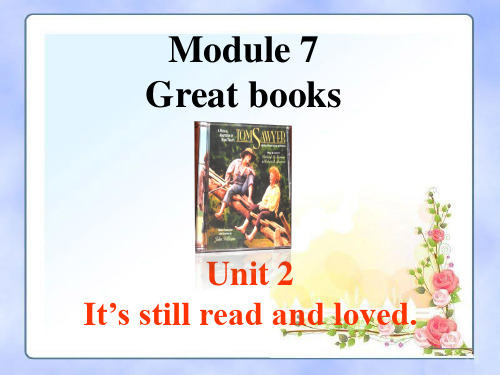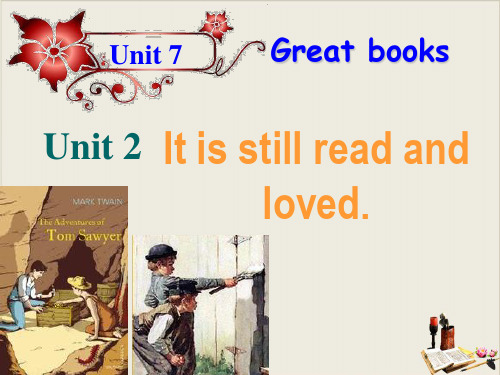Module7 Unit2 It is still read and loved
- 格式:ppt
- 大小:2.24 MB
- 文档页数:28

Module 7 Great booksUnit 2 It is still read and loved. & Unit 3Step 1 RevisionStep 2 Language points1. escape/I'skeIp/ v. 逃离;逃脱【考点】1. escape vi. 逃走,逃脱,脱离。
通常与 from 连用。
eg : The thief has escaped. 贼已经逃走了。
2. escape vt. 避开、躲避不愉快的事 (如危险、处罚、不幸、灾难等) 。
eg : He tried to escape punishment. 他设法躲避惩罚。
3. escape 后跟动词时,应跟其动 名词形式。
eg : There is no way to escape doing the work. 没有办法逃脱做这项工作。
【拓展】常见必须跟动名词作宾语的动词及短语:enjoy , finish , mind , practise , risk , allow , avoid , imagine , suggest , feel like , can't help(情 1.冒险(经历)________ 2.逃离;逃脱 ________3.死的;去世的 ________ →去世(动词)________ →去世(名词)________4.邻居 ________5. 惊奇的; 惊讶的 ________ → 对…… 感到惊奇( 动词)________ → 惊奇( 名 词)________6.活着的 ________7.南方的 ________ → 南方(名词) ________8.举止;行为;情节________ →表演(动词)________ →演员(名词) ________9.日常的;普通的 ________ 10.对话 ________ 1. get into trouble____________ 2. all over the world____________ 3. run away____________ 4. for a time____________5. 为……付出代价____________ 6.充满 ____________7.作为回报 ____________ 8.起初 ____________1.still, today, read, by, their, are, people, works, many( 今天,许多人仍然阅读他们的作品。





Module 7 unit2 It is still read and loved.教案外研版九年级上册Module 7 unit2 It is still read and loved.教案Lesson Objective:By the end of the lesson, students will be able to:Understand the significance and enduring popularity of classical literature in Chinese culture.Analyze the themes, characters, and messages conveyed in selected classical literary works.Appreciate the value and beauty of classical literature and its relevance in contemporary society.Materials:Whiteboard, markers, and eraserHandouts with excerpts from classical Chinese literatureAudio or video materials featuring recitations or discussions of classical literary worksWarm-up Activity :Begin the lesson by asking students about their favorite books or literary works.Discuss the importance of literature in preserving cultural heritage and promoting understanding among people.Introduce the concept of classical literature and its significance inChinese culture.IntroductionPresent examples of well-known classical Chinese literary works, such as “Dream of the Red Chamber,” “Journey to the West,” or “Romance of the Three Kingdoms.”Provide a brief overview of the selected literary works, highlighting their historical context and cultural importance.Engage students in a discussion about their initial impressions and expectations of classical literature.Literary Analysis :Distribute handouts with excerpts from one or two classical literary works.Instruct students to read the excerpts individually or in pairs and identify key themes, characters, and messages conveyed in the text.Facilitate a class discussion, allowing students to share their observations and interpretations.Write down key points on the whiteboard to summarize the analysis of the selected excerpts.Discussion and Reflection:Divide students into small groups and provide them with discussion questions related to the value and relevance of classical literature. Instruct the groups to discuss the enduring popularity of classical literaryworks and the reasons why they are still read and loved today. Encourage students to share personal experiences or cultural references that demonstrate the ongoing influence of classical literature in contemporary society.Rotate groups and facilitate class discussions, allowing students to exchange ideas and perspectives.Example discussion questions:What do you think makes classical Chinese literature timeless and beloved by readersHow do the themes and messages conveyed in classical works resonate with people’s lives todayWhat can we learn from classical literature and how can it help us understand our cultural heritageWrap-up and Appreciation:Summarize the main points discussed during the lesson, emphasizing the enduring value and importance of classical Chinese literature.Invite students to express their appreciation for classical literary works by sharing their favorite excerpts or passages from the texts. Encourage students to explore more classical literature beyond the classroom, either through reading books or watching adaptations in film or theater.Provide additional resources or suggestions for further exploration ofclassical Chinese literature, such as recommended books or online platforms featuring literary discussions or analyses.。
优质资料---欢迎下载Module 7 Great booksUnit 1 We ’re still influenced by Confucius ’s ideasM7 Unit 2 It is still read and loved.一、素养目标1.知识目标:Key words: get into trouble , run away, escape, dead, for a time, neighbour, surprised, alive,southern, state, pay for, action, everydayKey structues: It is written in everyday English.It is still read and loved by people all over the world.It is thought to be one of the greatest American stories.2.能力目标:读-----能够读懂介绍和评价文学作品的文章。
写-----能够写一篇短文介绍和评价自己喜爱的文学作品。
运用---能够制作阅读卡。
3.学习策略:自学、合作4.情感态度:爱读名著5.文化意识:加强对Mark Twain 的作品,及其创作的社会背景的了解。
二、课前预习1.自学课文生词。
学生们借助英语词典,使用思维导图,添加例句,丰富生词本。
2.再读语文课本的《百万英镑》,列出key words ,简要复述,谈感想及收获。
三、学习过程Step 1 Words reviewStep 2 Learn to learnStep 3 Mark Twain and his worksStep 4 While readingTask 1Look through the passage and match.Paragragh 1 A.the writer's favourite partParagraph 2 B.the themes and reasons of greatness What do you think of Mark Twain?Check the true sentences.1.Mark Twain didn't have enoughmoney to buy two tickets.2.Mark Twain's friend wasstrange.Paragraph 3 C.main charactersParagraph 4 D.a brief introductionTask 2Read Paragraph 1 of the passage quickly and try to answer the questions. Use the words and expression in the box to help you. (A1)1. What kind of story is The Adventures of Tom Sawyer?_________________________________________________________2. When and where is the story set?_________________________________________________________Task 31.Read Paragraph 2 - 3.2.How many characters are mentioned?charactersTask 4Read Paragraph 4. Why is the book great?a g r e a tb o o kTask 51.Watch a video and read.plete the passage with the correct form of the words in the box.(A4)Task 6Complete the table.(A3)Step 6 WritingWrite a passage about your favourite book. You can begin it like this.My favourite book is Harry Potter and Philosopher’s Stone by J.K. Rowling. It is a story about a boy…While writing,pay attention to the questions.Who wrote your favourite book?Where is the story set?Who are the main characters?Which part is your favourite?What can you learn from the book?_______________________________________________________________________________ _______________________________________________________________________________ _______________________________________________________________________________ _______________________________________________________________________________ _______________________________________________________________________________ _______________________________________________________________________________ _______________________________________________________________________________ _______________________________________________________________________________ ________________Step 7 ConsolidationStep 8 Homework1.1. Remember the words of Unit 2 and prepare the text of Unit 3.2.Write a passage about your favourite book.Mark Twain's sayingKeep away from people who try to belittle your ambitions. Small people always do that, but the really great make you feel that you, too, can become great.远离那些企图让你丧失雄心的人吧。